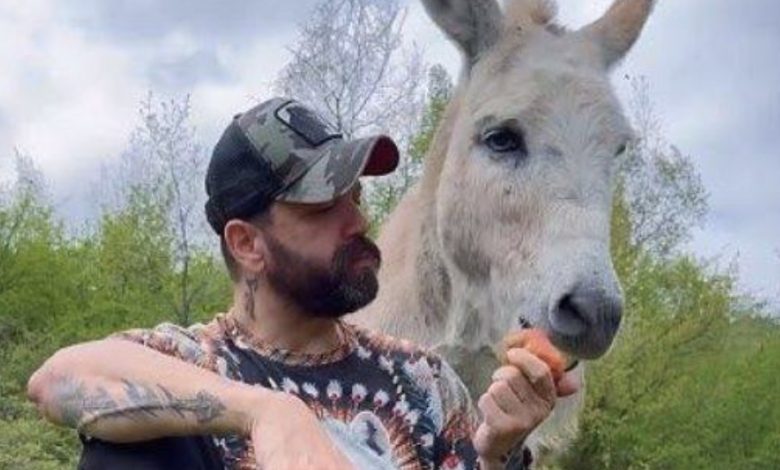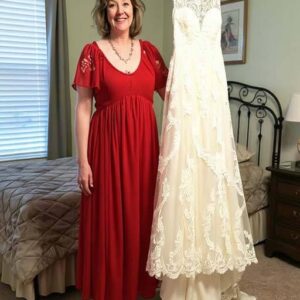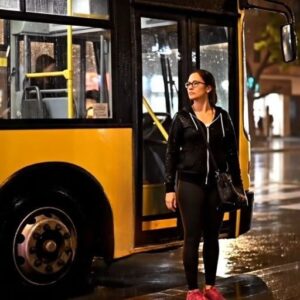
When I left Indianapolis, I didn’t slam the door behind me—I just walked out quietly. I didn’t owe anyone an explanation. I didn’t give my landlord a forwarding address. I left my job as a field technician with two weeks’ notice and zero fanfare. The only person who knew my plan was my sister, Carly, and even she thought I’d lost it.
“Jay, a cabin in the Blue Ridge Mountains?” she said over the phone, her voice trailing somewhere between concern and sarcasm. “You hate bugs. You cried over your last houseplant.”
She wasn’t wrong. But when you’re slowly becoming a ghost in your own life, you’ll try anything to feel real again. So I loaded up my 2005 Tacoma with tools, canned food, a water purifier, and every battered piece of who I used to be. The cabin had belonged to my grandfather, a man I barely knew and mostly remember as a stern figure in faded photographs. After he passed, no one touched the place. It sat like a forgotten thought, gathering dust and waiting for someone like me to run out of other ideas.
For the first couple of weeks, the silence was deafening.
No sirens. No buzzing phones. Just wind in the trees, the occasional owl, and the creak of the cabin settling under my weight. I chopped wood with blistered hands, learned to cook beans three different ways, and read books by headlamp until I forgot what day it was. I was alone. Finally. Gloriously alone.
Until the donkey showed up.
It was a Thursday. I only remember that because I was trying to follow a “chop wood every three days” schedule, and the math got weird. I was sitting on the front porch with a tin mug of instant coffee, watching fog cling to the trees like breath on glass. Then I saw movement on the ridge. Something brown. Low. Four-legged.
At first, I thought it was a mule deer, but as it trotted closer, I realized—nope. It was a donkey. A small, scrappy thing with shaggy fur and ears like satellite dishes. She came down the slope slowly, eyes locked on me like she was appraising the real estate. And then she walked straight up to my porch, stopped a few feet away, and stared at me like I’d interrupted her morning.
“Uh. Hey,” I said, because apparently I talk to donkeys now.
She didn’t blink. Didn’t bray. Just kept staring.
I sipped my coffee and looked away. When I looked back, she was gone.
The next morning, she returned.
Same time. Same look.
By day four, I gave her a name. Dot. Because there was a small black circle in the middle of her forehead like someone had poked her with an inky thumb.
She started following me around the property. I’d hike the trails behind the cabin, and she’d trot behind me like a furry, judgmental shadow. She stood watch while I hauled firewood. She sat beside me while I drank under the stars. Never a sound. Just her presence, calm and heavy like silence with weight.
I convinced myself she was just passing through. Maybe feral. Maybe a neighbor’s pet gone rogue. But there was something about her eyes—old eyes, knowing eyes. She looked at me like she saw everything I was trying to bury.
One morning, I overslept. No wood chopped. No coffee. The air was too heavy to move. I lay there staring at the ceiling like it might tell me what the hell I was doing with my life.
Then came a soft thump on the porch.
Dot.
I stumbled outside, still in flannel pants and socks. She was waiting, like always, standing by the steps like a clock that didn’t need winding. I sat beside her in the dew-wet grass, head heavy.
“Why do you keep coming back?” I asked.
She didn’t answer.
Just leaned her head against my shoulder, and that’s when I noticed something I hadn’t before. Her coat, coarse and unbrushed, was marked with faint scars—small but deliberate, like slashes. And under her left hind leg, almost hidden by fur, was a brand.
It wasn’t a ranch brand.
It looked more like something seared in a hurry—crooked lines, angry and crude.
That did it. I couldn’t pretend she just wandered here anymore. Someone had done that to her.
And maybe I’d seen enough pain in those eyes to recognize it.
I drove Dot to a vet three towns over in a rust-bucket horse trailer I borrowed from a guy who ran the local feed store. Said it was for a “rescue case,” and he didn’t ask more.
The vet, a wiry woman named Dr. Marta, took one look at Dot and sighed. “You did good bringing her in. She’s been through something.”
I asked if the brand meant anything.
She hesitated. “Could be an illegal breeder. Could be backyard livestock. Some folks use cruel methods to keep animals docile. See here?” She pointed to Dot’s back legs. “These weren’t just accidents. Someone beat this donkey.”
I clenched my fists. Hard.
I left Dot overnight for observation. The next morning, Dr. Marta handed me a clean bill of health and a quiet smile.
“She likes you,” she said, handing me a jar of salve. “You’re her person now. Whether you want her or not.”
When I brought Dot back to the cabin, something shifted. The place felt less like a hideout and more like a home. I built a small shelter for her beside the garden I’d half-abandoned. I found a rhythm in caring for her—feeding, brushing, even just sitting together under the stars. She never spoke, never made a sound, but she didn’t have to. Her presence was enough.
One morning in late spring, Carly visited.
She parked her rental with a dramatic sigh and climbed out in high-top sneakers and city sunglasses. “Okay,” she said, surveying the land. “This is either the start of a horror movie or a Hallmark special.”
She met Dot, raised an eyebrow, and said, “You have a donkey.”
“I guess I do,” I replied.
We sat on the porch for a while, watching the light spill between the trees.
“You seem… better,” she said after a while.
I nodded. “I think I needed something to take care of. Something that needed me back.”
She looked at Dot, then at me. “You know you saved her, right?”
I shook my head. “No. She saved me first.”
People always think healing comes in grand moments—epiphanies, sunsets, clean breaks. But sometimes, it’s slower than that. Sometimes it looks like a scarred donkey who won’t leave your side. Like learning to cook more than beans. Like realizing you’re not a ghost—you’re just someone who needed quiet long enough to hear themselves again.
Dot still follows me on hikes. Still waits for me every morning. And yeah, I still talk to her like she understands.
Because maybe she does.
If you’ve ever run away thinking solitude would solve everything—only to find that healing needs company, even the quiet kind—then maybe you get it too.
Would you have taken Dot in?
Like and share if this story moved you. Maybe someone else out there needs a nudge from an unexpected friend.




